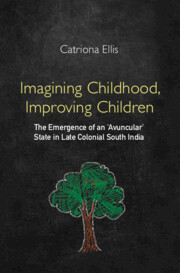 Imagining Childhood, Improving Children
Imagining Childhood, Improving Children Book contents
- Frontmatter
- Dedication
- Contents
- Acknowledgements
- List of Abbreviations
- Introduction
- 1 The Child at School: Compulsory Education in the Madras Presidency
- 2 Educating the Child: The Introduction of Compulsory Education in Madras City
- 3 Imagining the Child as Learner: Progressive Pedagogy in the Madras Presidency
- 4 Producing the Healthy Schoolchild
- 5 Saving the Child: The Madras Children Act, 1920, and the Beginnings of a Juvenile Justice System
- 6 Protecting the Poor Child: The Practical Expansion of Juvenile Justice
- 7 Defining Childhood: Sexual Parameters of Childhood
- 8 Remembering Childhoods: Childhood Memories in Autobiographies
- Conclusion: Children, Childhood and the Growth of the Avuncular State in South India
- Notes
- Bibliography
- Index
2 - Educating the Child: The Introduction of Compulsory Education in Madras City
Published online by Cambridge University Press: 19 April 2023
- Frontmatter
- Dedication
- Contents
- Acknowledgements
- List of Abbreviations
- Introduction
- 1 The Child at School: Compulsory Education in the Madras Presidency
- 2 Educating the Child: The Introduction of Compulsory Education in Madras City
- 3 Imagining the Child as Learner: Progressive Pedagogy in the Madras Presidency
- 4 Producing the Healthy Schoolchild
- 5 Saving the Child: The Madras Children Act, 1920, and the Beginnings of a Juvenile Justice System
- 6 Protecting the Poor Child: The Practical Expansion of Juvenile Justice
- 7 Defining Childhood: Sexual Parameters of Childhood
- 8 Remembering Childhoods: Childhood Memories in Autobiographies
- Conclusion: Children, Childhood and the Growth of the Avuncular State in South India
- Notes
- Bibliography
- Index
Summary
The introduction of compulsory education by the Madras Municipal Corporation signified a new departure in the history of children in the city. It meant that children became identified first and foremost as learners to be found within the institution of the school, even if this reflected a change in discursive emphasis rather than in lived reality. Chapter 1 has shown how the Madras Elementary Education Act, 1920, encouraged the introduction of compulsory elementary education throughout the presidency and the discursive, administrative and financial implications of this. Focusing on the specific local example of Madras City, this chapter starts by considering how compulsory schooling impacted the ways in which children were imagined by the modern Indian state. The child at school was not only a learner in the present but also a future citizen and adult-in-the-making. Education was linked to future democratic participation and to civic responsibilities within Madras City, and the child was brought into a direct relationship with the state as a valuable asset for the nation's future. This rhetoric surrounding the child as potential and as an investment was counterbalanced by an increasing sense of duty, couched in terms of a child's right to education, an idea that reflected south Indian participation in global humanitarian networks focused on children's rights. Moreover, by the 1930s there was a growing awareness of the child's capacity as a contributor, not merely disciplined into forms of being predetermined by adults but an active participant in their own educational process. All three of these aspects of childhood—as becoming, as being, as contributor—can be seen to some limited degree within the corporation debates.
The practical operation of the compulsory education scheme reveals the strategic priorities of the Madras political elite and the civil society activists who aided their endeavours. The tensions in the way that children were imagined were as much revealed in, and formed by, the small-scale interactions between children, their parents, teachers and the local councillors in the Standing Committee (Education) as in the grander discursive claims of the provincial assembly or main corporation proceedings. These exchanges reveal a widespread commitment to modern ideas of the child as intellectually malleable and physically vulnerable and as a learner identified according to a universalised category that prioritised biological age and drew a sharp distinction between the adult and the child.
- Type
- Chapter
- Information
- Imagining Childhood, Improving ChildrenThe Emergence of an ‘Avuncular’ State in Late Colonial South India, pp. 47 - 71Publisher: Cambridge University PressPrint publication year: 2023


